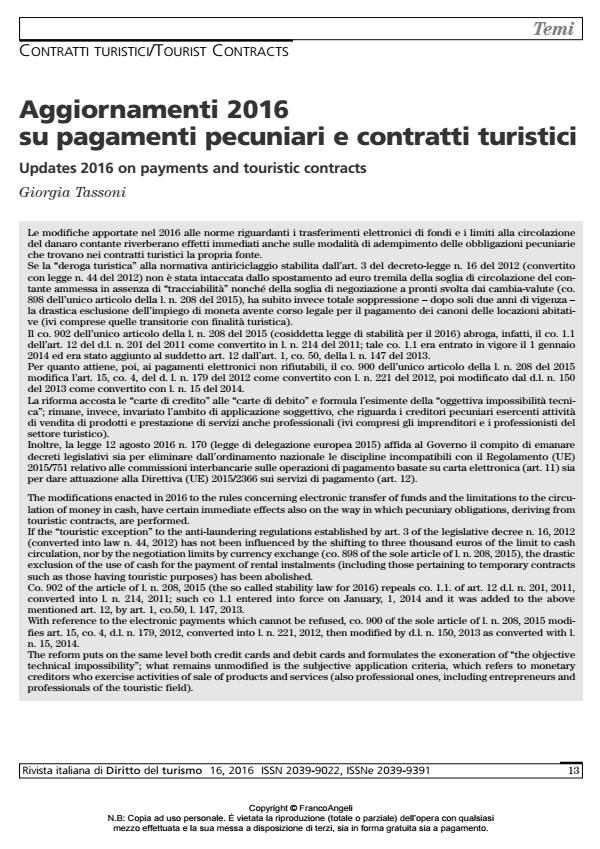Updates 2016 on payments and touristic contracts
Journal title RIVISTA ITALIANA DI DIRITTO DEL TURISMO
Author/s Giorgia Tassoni
Publishing Year 2017 Issue 2016/16 Language Italian
Pages 6 P. 13-18 File size 79 KB
DOI 10.3280/DT2016-016002
DOI is like a bar code for intellectual property: to have more infomation
click here
Below, you can see the article first page
If you want to buy this article in PDF format, you can do it, following the instructions to buy download credits

FrancoAngeli is member of Publishers International Linking Association, Inc (PILA), a not-for-profit association which run the CrossRef service enabling links to and from online scholarly content.
The modifications enacted in 2016 to the rules concerning electronic transfer of funds and the limitations to the circulation of money in cash, have certain immediate effects also on the way in which pecuniary obligations, deriving from touristic contracts, are performed. If the "touristic exception" to the anti-laundering regulations established by art. 3 of the legislative decree n. 16, 2012 (converted into law n. 44, 2012) has not been influenced by the shifting to three thousand euros of the limit to cash circulation, nor by the negotiation limits by currency exchange (co. 898 of the sole article of l. n. 208, 2015), the drastic exclusion of the use of cash for the payment of rental instalments (including those pertaining to temporary contracts such as those having touristic purposes) has been abolished. Co. 902 of the article of l. n. 208, 2015 (the so called stability law for 2016) repeals co. 1.1. of art. 12 d.l. n. 201, 2011, converted into l. n. 214, 2011; such co 1.1 entered into force on January, 1, 2014 and it was added to the above mentioned art. 12, by art. 1, co.50, l. 147, 2013. With reference to the electronic payments which cannot be refused, co. 900 of the sole article of l. n. 208, 2015 modifies art. 15, co. 4, d.l. n. 179, 2012, converted into l. n. 221, 2012, then modified by d.l. n. 150, 2013 as converted with l. n. 15, 2014. The reform puts on the same level both credit cards and debit cards and formulates the exoneration of "the objective technical impossibility"; what remains unmodified is the subjective application criteria, which refers to monetary creditors who exercise activities of sale of products and services (also professional ones, including entrepreneurs and professionals of the touristic field). In addition, l. dated August 12, 2016 n. 170 calls for the Government to issue legislative decrees, both in order to eliminate from national systems those disciplines that are not compatible with Reg. (UE) 2015/751 related to interbank commissions on payments based on electronic cards (art. 11), and in order to enact the Directive (UE) 2015/2366 on payment services (art. 12).
Giorgia Tassoni, Aggiornamenti 2016 su pagamenti pecuniari e contratti turistici in "RIVISTA ITALIANA DI DIRITTO DEL TURISMO" 16/2016, pp 13-18, DOI: 10.3280/DT2016-016002